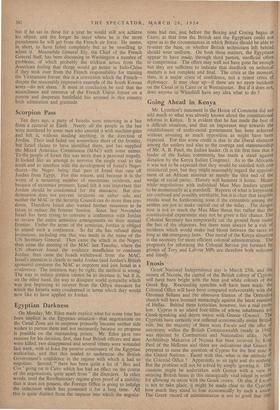Going Ahead in Kenya
Mr. Lyttelton's statement in the House of Commons did not add much to what was already known about the constitutional reforms in Kenya. It is evident that he has made the best of a difficult situation, and that an important step towards the establishment of multi-racial government has been achieved without arousing as much opposition as might have been expected. For this some credit is due to the liberal elements among the settlers and also to the courage and statesmanship of Mr. A. B. Patel, the Indian leader. (It is the first time that a leader of the Indian community has made a stand against dictation by the Kenya Indian Congress). As to the Africans, it was not to be expected that they would be satisfied with one ministerial post, but they might reasonably regard the appoint- ment of an African minister as merely the thin end of the wedge of racial parity. History will hammer it home. Mean.- whilenegotiations with individual Mau Mau leaders appear to be momentarily at a standstill. Reports of what is happening are confused and possibly unreliable, but it is clear that tangible results must be forthcoming soon if the extremists among the settlers are not to make capital out of the delay. The danger now is not so much the Mau Mau threat but rather that the constitutional experiment may not be given a fair chance. The Colonial Secretary has temporarily cut the ground from under the feet of the objectors, but there must always be a risk of incidents which would make bad blood between the races as long as the emergency lasts. One moral of the Kenya situation is the necessity for more efficient colonial administration. The proposals for reforming the Colonial Service put forward by groups of Tory and Labour MPs are therefore both welcome and timely.










































 Previous page
Previous page